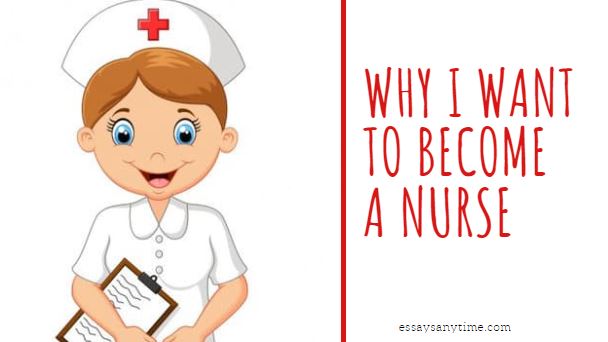Why I want to become a Nurse- 500 words
The following is a 500-word essay on why I want to be a nurse-sample written by our expert writers. If you need a similar essay done from scratch by one of our expert writers please do not hesitate to check our essay writing service.
When I was about ten-years-old, my grandfather, who is a retired veteran, suffered a severe case of comorbid Post-traumatic stress disorder (PTSD) and alcoholism. He was admitted to a residential facility for his treatment. Although the treatment process was rigorous and stressful, he managed to make a quick recovery thanks to his nurses and the care team. While visiting him, I was inspired by the nurses’ ability to make him feel comfortable, promptly administer care when needed, and their capacity to intercede him by understanding his needs; this became the foundation for my motivation to become a nurse.
I want to become a nurse to satisfy my passion for helping those in their most vulnerable moment, relieve their pain, and improve their quality of life. As key professionals in the delivery of healthcare, nurses play major roles in the coordination and provision of care, optimization of health service productivity, prevention of adverse events, and improvement of patient outcomes (Oldland et al., 2020). The role of nurses in improving patient outcomes is aligned with their need to provide patient-centered care through partnering with the patients and their families to make health-related decisions and goal setting. As a nurse, I aspire to use my technical and non-technical skills to provide high-quality healthcare to the patients, improve patient safety and their overall health outcome; this will help bring joy and comfort to those who are suffering from various diseases. Nursing practices also improve the functionality and wellbeing of the patients, hence fundamentally help in improving their quality of life.
Similarly, I aspire to improve the health of the most vulnerable population, particularly the elderly and children, through nursing advocacy. The elderly and children are usually more vulnerable in the clinical setting because of lack of awareness, education, and fear (Nsiah et al, 2019). Through advocacy, nurses are able to promote and defend the right of the patients and their interests in any care situation. Advocacy allows nurses to deliver vulnerable patients from unnecessary treatments and provide them with the best quality health care. However, for me, I aspire to move nursing advocacy beyond the bedside and into the leadership space through advocating for health reforms and enactment of policies that benefit the elderly and children. Indeed, according to Bridget and Lisa (2019), nurses occupy a unique position to contribute to the development of health policies and executive decision-making by bringing in their knowledge and experience in patient care, safety, quality, wellness, and cost containment.
Additionally, as I continue to advance my education, my commitment and interest in nursing become even stronger as I begin to realize that I have the aptitude for nursing as a job. I believe that my interpersonal skills such as effective communication, ability to work in a team, and personal attributes including empathy, stress tolerance, adaptability, critical thinking, conflict resolution, accountability, and emotional intelligence will allow me to effectively carry out my nursing roles and promote safe and quality healthcare. Similarly, I love learning new things which aligns with the core element of life-long learning in nursing. Nurses are required to continuously learn to keep up with the current medical trends.
Also, apart from the rewarding nature of the job, I am drawn into the nursing career because of the job security that it offers. Nursing is one of the fastest-growing occupations in the U.S. This is attributed to the rise in healthcare needs, growth in population, and low rates of mortality. According to the U.S. Bureau of Labor Statistics (2021), the job outlook for nursing is estimated to be 7% (growing faster than average) from 2019 to 2029. Therefore, with nursing, I do not have to worry about ever tarmacking to find a job once I have graduated.
References
Bridget, R, Lisa, K. (2019). Attending to vulnerable populations through nurse advocacy on boards and in public service. Creative Nursing, 25(2), 82-86. https://doi.org/10.1891/1078-4535.25.2.82
Bureau of Labor Statistics (2021). Registered nurses: Occupational outlook handbook. https://www.bls.gov/ooh/healthcare/registered-nurses.htm
Nsiah, C., Siakwa, M., & Ninnoni, J. P. (2019). Registered nurses’ description of patient advocacy in the clinical setting. Nursing Open, 6(3), 1124-1132. https://doi.org/10.1002/nop2.307
Oldland, E., Botti, M., Hutchinson, A. M., & Redley, B. (2020). A framework of nurses’ responsibilities for quality healthcare — Exploration of content validity. Collegian, 27(2), 150-163. https://doi.org/10.1016/j.colegn.2019.07.007
